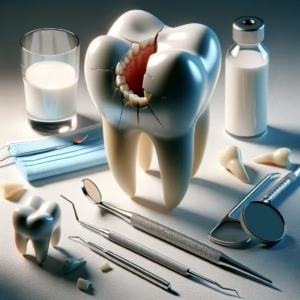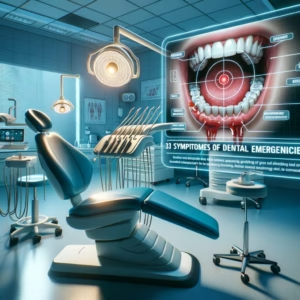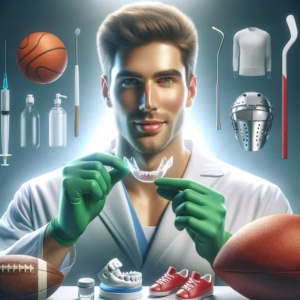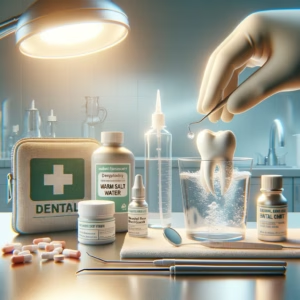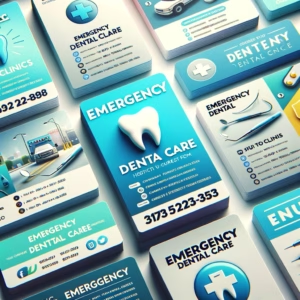Understanding Dental Emergencies
Understanding Dental Emergencies: An Overview
Introduction
- Definition of dental emergencies
- Importance of prompt treatment
- Overview of common dental emergencies in adults
I. Common Dental Emergencies
A. Severe Toothaches
- Causes
- Dental decay
- Gum disease
- Cracked tooth
- Recognizing a Toothache
- Symptoms: throbbing pain, sensitivity to hot/cold, swelling
- Immediate Actions
- Rinse mouth with warm salt water
- Over-the-counter pain relief (e.g., ibuprofen)
- Avoid certain foods and drinks
- Schedule an urgent dental appointment
B. Lost Fillings
- Causes
- Decay beneath the filling
- Chewing hard foods
- Recognizing a Lost Filling
- Sharp pain or discomfort in the affected tooth
- Visible hole or loss of material
- Immediate Actions
- Clean the area gently with warm water
- Use dental cement or an over-the-counter temporary filling material if necessary
- Visit the dentist as soon as possible
C. Knocked-Out Teeth (Avulsed Teeth)
- Causes
- Sports injuries
- Falls or accidents
- Recognizing a Knocked-Out Tooth
- Complete loss of tooth from the socket
- Immediate Actions
- Handle the tooth by the crown (not the root)
- Rinse gently with water if dirty (do not scrub)
- Reinsert tooth into the socket if possible or store in a container with milk or saline
- Seek dental care within 30 minutes for the best chance of reattachment
D. Broken or Chipped Teeth
- Causes
- Trauma or injury
- Chewing on hard objects
- Recognizing a Broken Tooth
- Visible crack or chip
- Pain or sensitivity in the affected area
- Immediate Actions
- Rinse mouth with warm water
- Apply a cold compress to reduce swelling
- Avoid using the tooth for chewing
- Visit the dentist for evaluation and treatment
E. Abscessed Teeth
- Causes
- Untreated tooth decay or gum disease
- Bacterial infection
- Recognizing an Abscess
- Severe pain, swelling, and/or pus discharge
- Fever or swollen lymph nodes
- Immediate Actions
- Rinse with warm salt water
- Take over-the-counter pain relief
- Seek immediate dental care
II. Importance of Early Recognition and Treatment
- Discuss the risks of delaying treatment
- Potential complications (e.g., infection, tooth loss)
- Emphasizing the role of regular dental check-ups
III. Prevention Tips
- Maintaining good oral hygiene
- Regular dental visits
- Wearing mouthguards during sports
- Avoiding hard foods that could damage teeth
Conclusion
- Recap the importance of understanding dental emergencies
- Encourage readers to be proactive about dental health
- Emphasize the need to seek prompt care to prevent complications
Additional Resources
- Provide links or references for further reading on dental care and emergencies.
- Contact information for local dental emergency services.
Identifying Symptoms
Identifying Symptoms of Dental Emergencies
- Signs and Symptoms of a Dental Emergency
Swelling: Any swelling in the face, gums, or jaw can indicate a serious issue, such as an abscess or infection. Immediate attention is necessary, especially if swelling is accompanied by fever or difficulty swallowing.
Bleeding: Uncontrolled bleeding from the gums or mouth can be a sign of a dental emergency. If bleeding persists after applying pressure for 10 minutes, seek professional help immediately.
Pain Levels: Severe or debilitating pain that interrupts daily activities or sleep should not be ignored. This could indicate conditions like an abscess, severe tooth decay, or a cracked tooth that requires urgent care.
- Tips for Determining the Severity of the Situation
Evaluate Pain Intensity: Rate the pain on a scale of 1 to 10. If it is 7 or higher, consider it a dental emergency.
Consider Duration: If symptoms such as pain, swelling, or bleeding last longer than a few hours without improvement, it is advisable to seek dental attention.
Examine Accompanying Symptoms: Look for additional signs such as fever, chills, or swelling of the face or neck, which may indicate a more serious infection requiring immediate treatment.
- When to Seek Professional Help
Immediate Care Needed: Seek professional help if you experience:
- Severe or worsening pain that does not subside with over-the-counter pain relief.
- Uncontrolled bleeding or swelling that does not improve after applying pressure.
- A knocked-out tooth that cannot be reinserted or stored properly.
- Symptoms of infection, such as fever, pus, or swollen lymph nodes.
Urgent Dental Appointment: Schedule an urgent dental appointment if you notice:
- A persistent toothache or signs of decay.
- A broken tooth causing significant discomfort.
- Any dental issue that interferes with daily activities or quality of life.
By understanding these symptoms and guidelines for determining the severity of dental issues, individuals can take proactive measures to ensure prompt and effective treatment for dental emergencies.
Common Dental Emergencies in Ashburn, VA
F. Sports Injuries Leading to Dental Trauma
- Causes
- Contact sports such as football, basketball, and hockey
- Recreational activities without proper protective gear
- Recognizing Sports-Related Dental Trauma
- Knocked-out teeth or fractured teeth
- Soft tissue injuries, including cuts or bruises to the gums and lips
- Immediate Actions
- For a knocked-out tooth, follow the immediate actions outlined in section C.
- For broken teeth, rinse the mouth with warm water and apply a cold compress to reduce swelling.
- Seek dental care as soon as possible to assess injuries and begin appropriate treatment.
G. Accidents and Falls
- Causes
- Slip and falls, especially in children and the elderly
- Motor vehicle accidents
- Recognizing Dental Injuries from Accidents
- Visible damage to teeth or gums
- Pain or sensitivity that develops after the incident
- Immediate Actions
- Rinse the mouth gently with warm water and look for any visible damage.
- If a tooth is knocked out or broken, follow the procedures identified in sections C and D.
- Schedule an urgent dental appointment to evaluate any damage and plan necessary treatment.
Local Insights on Dental Emergencies in Ashburn, VA
Ashburn, VA, is a vibrant community with a variety of sports programs for children and adults, contributing to a heightened risk of dental injuries. According to local health reports, sports-related injuries account for about 20% of dental emergencies in the area, highlighting the importance of using protective gear such as mouthguards during athletic activities. Additionally, statistics indicate that emergency dental visits in Loudoun County have seen a 15% increase in the past five years, emphasizing the need for awareness and preparedness regarding dental emergencies.
In response to these trends, many local dental practices have begun to promote sports safety programs, including free mouthguard fittings and educational workshops on injury prevention. This proactive approach not only aids in reducing the incidence of dental trauma but also fosters a community understanding of emergency dental care.
Immediate First Aid
F. Dental Emergencies: Immediate First Aid Steps
A. Severe Toothaches
- Immediate Actions
- Rinse mouth with warm salt water to help reduce inflammation and cleanse the area.
- Take over-the-counter pain relief, such as ibuprofen, according to the package instructions.
- Avoid very hot, cold, or sugary foods and drinks that may irritate the tooth.
- Schedule an urgent dental appointment as soon as possible.
B. Lost Fillings
- Immediate Actions
- Clean the area gently with warm water to remove any debris.
- If available, use dental cement or an over-the-counter temporary filling material to cover the cavity until you can see a dentist.
- Visit the dentist as soon as possible to replace the filling properly.
C. Knocked-Out Teeth (Avulsed Teeth)
- Immediate Actions
- Handle the tooth by the crown (the part that is usually visible in the mouth), avoiding touching the root.
- Rinse the tooth gently with water if it is dirty; do not scrub or remove any tissue fragments.
- If possible, reinsert the tooth into its socket, ensuring it faces the right way.
- If reinsertion is not possible, store the tooth in a container with milk or saline to keep it moist.
- Seek dental care within 30 minutes for the best chance of successful reattachment.
D. Broken or Chipped Teeth
- Immediate Actions
- Rinse mouth with warm water to clean the area and reduce the risk of infection.
- Apply a cold compress on the outside of the mouth to help reduce swelling and alleviate pain.
- Avoid using the affected tooth for chewing to prevent further damage.
- Visit the dentist as soon as possible for evaluation and treatment.
E. Abscessed Teeth
- Immediate Actions
- Rinse with warm salt water to help draw out infection and soothe the area.
- Take over-the-counter pain relief to manage discomfort as needed.
- Seek immediate dental care, as abscesses can lead to serious complications if not treated promptly.
Finding Emergency Dental Care in Ashburn
Finding Emergency Dental Care in Ashburn, VA
In the event of a dental emergency, having access to immediate care is crucial. Below are resources and contact information for local dental clinics in Ashburn that offer emergency services, including after-hours care. It’s wise to keep these resources handy for quick reference in case of an emergency.
Local Emergency Dental Services
- Ashburn Dental Care
- Address: 44780 Maycrest Cir, Ashburn, VA 20147
- Phone: (571) 291-8880
- Website: ashburndentalcare.com
- After-Hours Care: Offers 24/7 emergency dental services with a dedicated phone line for urgent cases.
- Virginia Family Dentistry
- Address: 21351 Windmill Parc Dr, Ashburn, VA 20147
- Phone: (703) 724-3000
- Website: virginiafamilydentistry.com
- After-Hours Care: Emergency services available during weekends and after normal office hours; call for details.
- Summit Dental
- Address: 20989 Ashburn Rd, Ashburn, VA 20147
- Phone: (703) 729-5555
- Website: summitdentalva.com
- After-Hours Care: Provides emergency dental services; call to schedule an appointment outside regular hours.
- Bright Now Dental
- Address: 44295 Ice Rink Plaza, Ashburn, VA 20147
- Phone: (703) 726-9966
- Website: brightnow.com
- After-Hours Care: Offers emergency care; check their website for hours or call for immediate assistance.
- Reston Dental Care
- Address: 1850 Town Center Dr #210, Reston, VA 20190 (a short drive from Ashburn)
- Phone: (703) 707-9797
- Website: restondentalcare.com
- After-Hours Care: Provides emergency services with evening and weekend appointments available.
Important Considerations
- Insurance: Check with your dental insurance provider to ensure that emergency services are covered and inquire about any additional costs.
- Preparation: Keep your dental provider’s contact information readily accessible on your phone or in a visible location at home.
- Document Emergencies: If possible, keep a record of any dental emergencies, including symptoms and actions taken, to share with your dentist.
By having these resources and contact information at your fingertips, you can act quickly and efficiently during a dental emergency.
Preventive Measures
III. Prevention Tips
Maintaining Good Oral Hygiene
- Brush teeth at least twice a day with fluoride toothpaste.
- Floss daily to remove plaque between teeth.
- Use an antibacterial mouthwash to help reduce oral bacteria.
Regular Dental Visits
- Schedule check-ups every six months for professional cleanings and examinations.
- Discuss any concerns with your dentist to address issues before they escalate into emergencies.
Wearing Mouthguards During Sports
- Utilize custom-fitted mouthguards during contact sports to protect teeth from impact.
- Consider using mouthguards for recreational activities as well, such as skateboarding or cycling.
Avoiding Hard Foods That Could Damage Teeth
- Be cautious when consuming hard candies, ice, or other tough foods that can lead to chips or breaks.
- Cut hard foods into smaller, manageable pieces to reduce the risk of injury.
Managing Bruxism (Teeth Grinding)
- If you grind your teeth, consult your dentist about a nightguard to protect your teeth during sleep.
- Practice stress-relief techniques to minimize grinding.
Educating Yourself and Others
- Understand common dental issues and their prevention to reduce the risk of emergencies.
- Share knowledge about oral health with family and friends to encourage collective care.
Conclusion
- Recap the importance of understanding dental emergencies
- Encourage readers to be proactive about dental health
- Emphasize the need to seek prompt care to prevent complications

